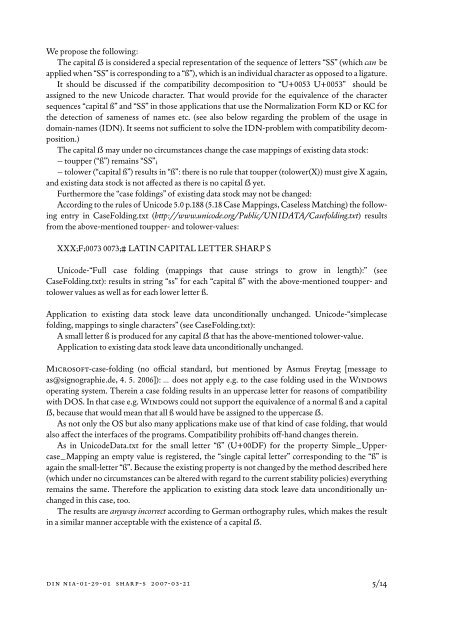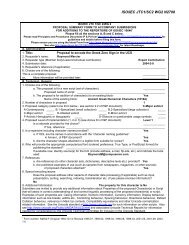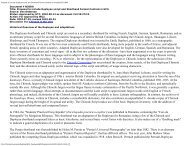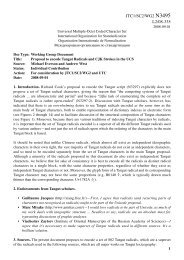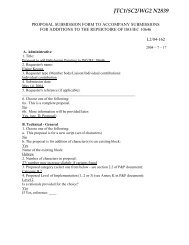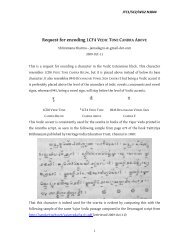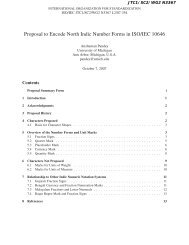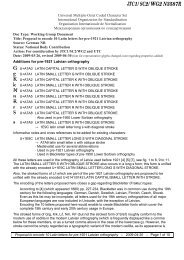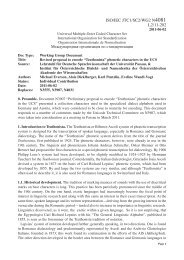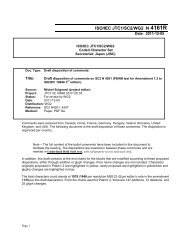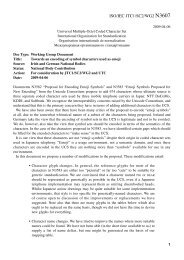Proposal to encode Latin Capital Letter Sharp S - FTP Directory ...
Proposal to encode Latin Capital Letter Sharp S - FTP Directory ...
Proposal to encode Latin Capital Letter Sharp S - FTP Directory ...
Create successful ePaper yourself
Turn your PDF publications into a flip-book with our unique Google optimized e-Paper software.
We propose the following:<br />
The capital $ is considered a special representation of the sequence of letters “SS” (which can be<br />
applied when “SS” is corresponding <strong>to</strong> a “ß”), which is an individual character as opposed <strong>to</strong> a ligature.<br />
It should be discussed if the compatibility decomposition <strong>to</strong> “U+0053 U+0053” should be<br />
assigned <strong>to</strong> the new Unicode character. That would provide for the equivalence of the character<br />
sequences “capital ß” and “SS” in those applications that use the Normalization Form KD or KC for<br />
the detection of sameness of names etc. (see also below regarding the problem of the usage in<br />
domain-names (IDN). It seems not su⁄cient <strong>to</strong> solve the IDN-problem with compatibility decomposition.)<br />
The capital $ may under no circumstances change the case mappings of existing data s<strong>to</strong>ck:<br />
– <strong>to</strong>upper (“ß”) remains “SS”;<br />
– <strong>to</strong>lower (“capital ß”) results in “ß”: there is no rule that <strong>to</strong>upper (<strong>to</strong>lower(X)) must give X again,<br />
and existing data s<strong>to</strong>ck is not aƒected as there is no capital $ yet.<br />
Furthermore the “case foldings” of existing data s<strong>to</strong>ck may not be changed:<br />
According <strong>to</strong> the rules of Unicode 5.0 p.188 (5.18 Case Mappings, Caseless Matching) the following<br />
entry in CaseFolding.txt (http://www.unicode.org/Public/UNIDATA/Casefolding.txt) results<br />
from the above-mentioned <strong>to</strong>upper- and <strong>to</strong>lower-values:<br />
XXX;F;0073 0073;# LATIN CAPITAL LETTER SHARP S<br />
Unicode-“Full case folding (mappings that cause strings <strong>to</strong> grow in length):” (see<br />
CaseFolding.txt): results in string “ss” for each “capital ß” with the above-mentioned <strong>to</strong>upper- and<br />
<strong>to</strong>lower values as well as for each lower letter ß.<br />
Application <strong>to</strong> existing data s<strong>to</strong>ck leave data unconditionally unchanged. Unicode-“simplecase<br />
folding, mappings <strong>to</strong> single characters” (see CaseFolding.txt):<br />
A small letter ß is produced for any capital $ that has the above-mentioned <strong>to</strong>lower-value.<br />
Application <strong>to</strong> existing data s<strong>to</strong>ck leave data unconditionally unchanged.<br />
Microsoft-case-folding (no o⁄cial standard, but mentioned by Asmus Freytag [message <strong>to</strong><br />
as@signographie.de, 4. 5. 2006]): … does not apply e.g. <strong>to</strong> the case folding used in the Windows<br />
operating system. Therein a case folding results in an uppercase letter for reasons of compatibility<br />
with DOS. In that case e.g. Windows could not support the equivalence of a normal ß and a capital<br />
$, because that would mean that all ß would have be assigned <strong>to</strong> the uppercase $.<br />
As not only the OS but also many applications make use of that kind of case folding, that would<br />
also aƒect the interfaces of the programs. Compatibility prohibits oƒ-hand changes therein.<br />
As in UnicodeData.txt for the small letter “ß” (U+00DF) for the property Simple_Uppercase_Mapping<br />
an empty value is registered, the “single capital letter” corresponding <strong>to</strong> the “ß” is<br />
again the small-letter “ß”. Because the existing property is not changed by the method described here<br />
(which under no circumstances can be altered with regard <strong>to</strong> the current stability policies) everything<br />
remains the same. Therefore the application <strong>to</strong> existing data s<strong>to</strong>ck leave data unconditionally unchanged<br />
in this case, <strong>to</strong>o.<br />
The results are anyway incorrect according <strong>to</strong> German orthography rules, which makes the result<br />
in a similar manner acceptable with the existence of a capital $.<br />
din nia-01-29-01 sharp-s 2007-03-21<br />
5/14


